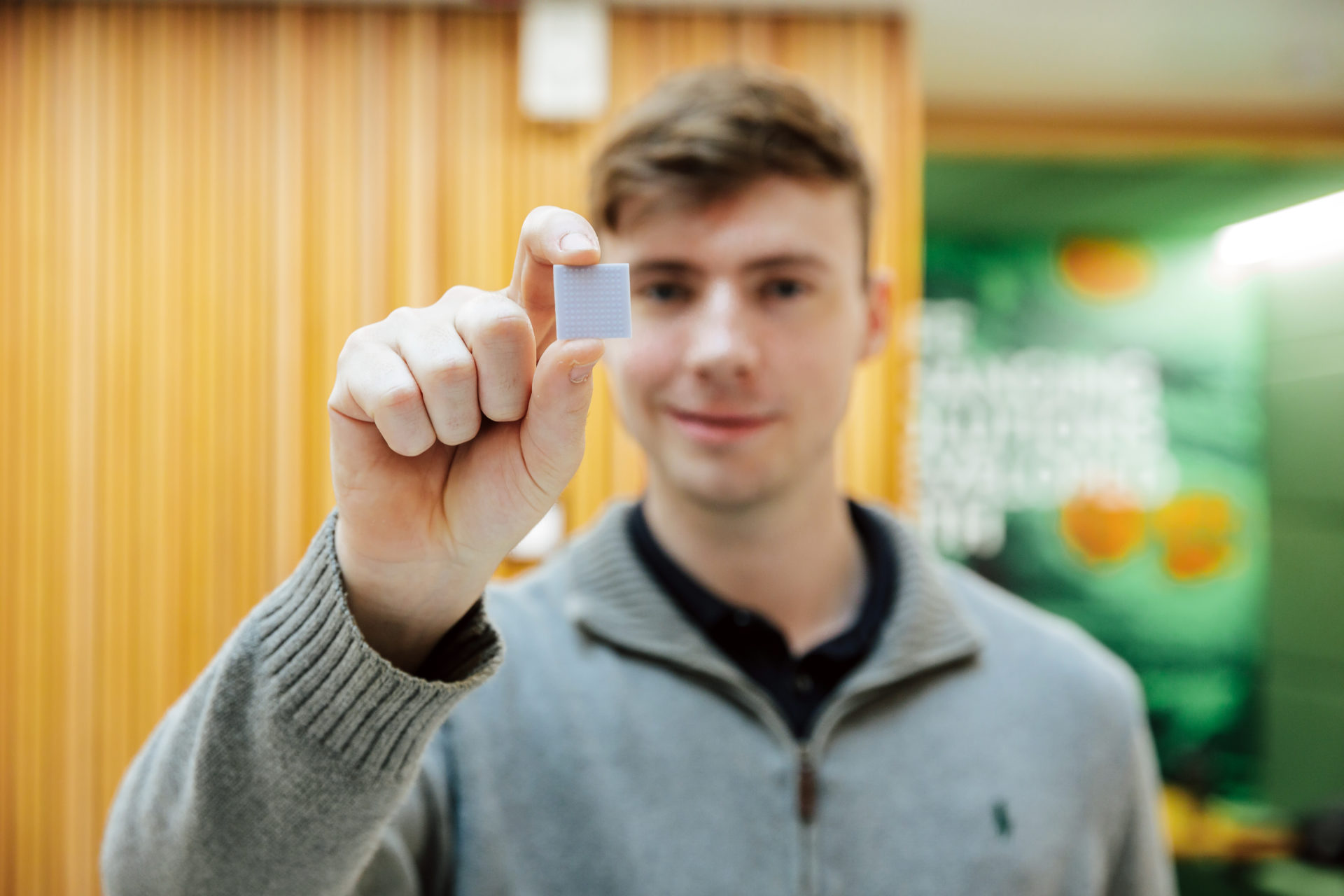Henry Dunne and Ian Bartenev - BSc Biotechnology with Enterprise

BSc Biotechnology with Enterprise students Henry Dunne and Ian Bartanev received Spark Scholarships to help them develop their vaccine administration product using both their biotech knowledge and their newfound business development skills.
Building foundations with enterprise study
The initial enterprise modules Henry and Ian studied within their course gave them the foundations they needed to create a business. ‘Our module leaders taught us how to write an attractive and comprehensive business plan, carry out market research and understand market segmentation,’ Henry explains.
‘I found the enterprise funding module particularly useful,’ Ian adds. ‘I liked the structure of the teaching: each week we studied a different area of business planning, and we needed to analyse the information we’d been taught to understand how to structure and future-proof a business model.’
Developing an innovative and complex business
Henry and Ian applied their enterprise learnings to their biotech background to create a revolutionary business. ‘Our business, MNS, is all about manufacturing and delivering self-adhesive vaccine patches,’ Ian explains. ‘It uses microneedle technology so you simply place the patch on your skin, receiving the same high-level of vaccine protection as an injection but with fewer side effects. This self-administration relives the pressure on the NHS, and the microneedles mean the vaccine is painless as it avoids nerve endings - so it’s more accessible to different demographics.’
‘Though we’re beginning by looking at how microneedle technology can administer vaccines, the patch is so diverse it’s very compatible with other drugs,’ continues Henry. ‘We’ve spoken with medical virology professors at University of Leeds. They believe as the patch produces a mucosal immune response - one of the strongest immune responses possible - alongside the fact the patch is extremely versatile with the drugs it is compatible with, it could lead the way for the treatment of chronic illnesses, such as replacing insulin jabs.’

Gaining support by growing Spark networks
Henry and Ian presented their project to the Spark team in their first term of enterprise study, and were awarded Spark scholarship. ‘The scholarship meant we can run our business from the Spark Incubator and benefit from a registered company address,’ Ian says. ‘We’ve had chance to gain access to equipment using the funds from our scholarship and business advice that’s only available through Spark. What’s more, the team at the Spark Incubator have really helped build our network to gain the right contacts. Their specialists have been a huge support, helping us solve problems with any tech issues we’ve had and answering our questions quickly. Yet everyone in Spark has been very friendly, and we’ve been invited to many events where we’ve had the opportunity to meet people in the same enterprise sphere.’
Henry also credits the support of the enterprise ambassadors ‘We’ve had a couple of meetings with Robert Barnes, an Enterprise Ambassador and Alumnus of Leeds with experience in venture financing, which have been really insightful,’ he explains. ‘What’s key for the patches is the number of regulations in the industry and the complexity of the technology. Yet Robert has been able to share his invaluable experience in accountancy and investing in biotech companies who are developing similar drug delivery devices. It’s been great first-hand insight to help us focus on strategies for product development and how to bring the patches to market.’

Focussing on the next stage of business progression
The support of Spark and the CEES department will continue to help Henry and Ian as they move into their third year of degree study. ‘To date we’ve been working on the business technology, but now we need to prepare for the pre-clinical trials,’ Ian says. ‘We’ll develop a plan to allow the patches to be accepted and approved by relevant regulatory agencies. Then, we’ll need to identify the different experiments and procedures required to prove the product is safe and effective.’
‘Our enterprise education has given us access to world-class professionals, leading the way in biotech businesses,’ Henry says. ‘It’s thanks to them that we’ve been able to make the right connections so early on in our business and then progress this far. Enterprise Ambassadors continue to help us with our financial projections, and we’ve welcomed the help everyone at CEES and Spark has given us so we can discover ways to run our business better. And we still have another year of study, so there’s plenty of time to benefit from everything the university offers in student enterprise and develop MNS further.’
Praising the modules and planning next stages
‘I’d really recommend including enterprise in a course of degree study,’ concludes Ian. ‘It allows you to bring together key strengths to build a business that works for you: I’ve always had a desire to create a biotech company, so this really is the right course at the right time for me.’
Henry is considering a Master’s to broaden his horizons, but his first objective is to run and build MNS. ‘It’s a truly revolutionary project,’ he says. ‘The technology has been around for a while but no-one has yet taken it to market. I whole-heartedly believe the business we’ve created through CEES, Spark and the Enterprise Ambassadors has the potential to change people’s lives, and we’ve learnt first-hand how actively working with others and expanding our networks can accelerate our ideas’.
